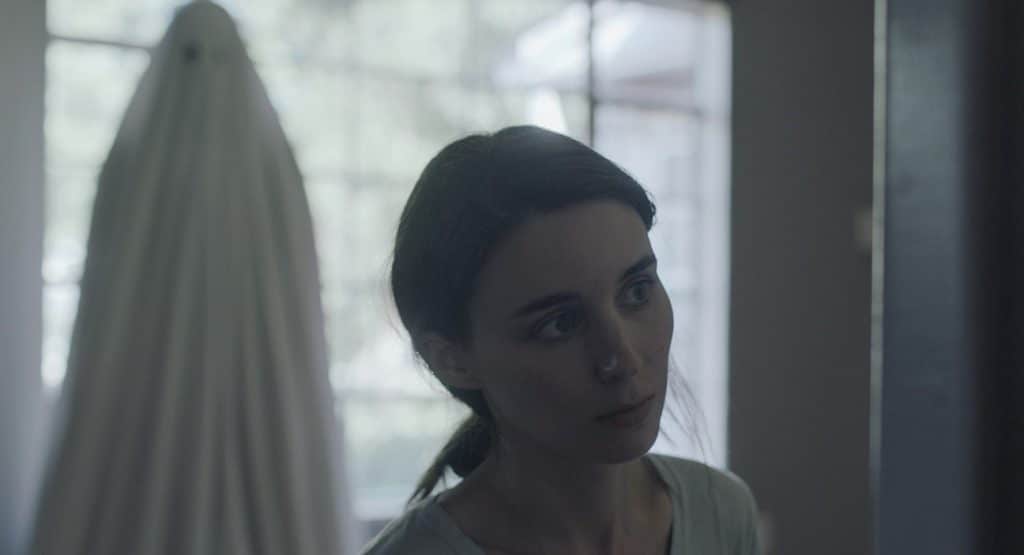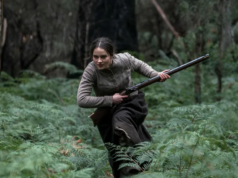Profoundly melancholy and devastatingly sad, A Ghost Story is a beautiful film about memory, loneliness and longing for something you lost forever
A Ghost Story (2017)
Written and directed by David Lowery. Starring Casey Affleck, Rooney Mara, Will Oldham, Sonia Acevedo, Rob Zabrecky, Liz Franke, Grover Coulson, Kenneisha Thompson, Barlow Jacobs, McColm Sephas Jr. and Kesha.
Ghost stories are present in almost every culture in our world. You can find many accounts on the internet of haunted houses, restless specters and deceased individuals who refuse to cross over to the other side and are tied to this plane of existence for some emotional reason or a life they can’t leave behind. If those stories are real, who knows. But they feed our collective fears and are the very stuff of horror films. A Ghost Story, David Lowery’s foray into this supernatural realm, is about a ghost — only it is told from the point of view of the ghost itself as a melancholy story about loss, loneliness and longing for someone who is gone. The real dread here comes with the realization that you are but a shadow of who you used to be and what you had.
Written by Lowery, who already gave us the equally melancholy Ain’t Them Bodies Saints (2013), A Ghost Story begins with M (Rooney Mara) telling her husband C (Casey Affleck) that when she was little, she used to move all the time and hide small notes with things she wanted to remember, so that if she ever wanted to go back, there would be a piece of her waiting. While C is a sensitive composer attached to their home, M wants to move out. One day, C dies in a car accident and rises from the mortician’s table as a white-sheeted ghost. When a door full of light appears before him, he refuses to go through and heads back home to be with his grief-stricken wife. Invisible to her, he can only witness as time goes by and she gradually slips away.
Shooting his film in an aspect ratio of 1.33:1 with rounded corners to emphasize the character’s existence as if trapped inside a box, Lowery introduces us to the couple’s relationship in a very economical way, like when they talk about tuning the piano or when we see their affection in bed. One night, they hear a mysterious bang on the piano and the film’s aspect even widens for a brief moment as we see a bright spectral light floating among the stars in outer space, as though evoking the cosmic weight of existence like in a Terrence Malick film. Then, in another scene, the camera pans from their home to show the car accident and C dead behind the wheel. There is a powerful, unshakable sense of inescapability in all this.
The bluish palette after C awakes as a ghost is oppressive, and the white sheet with eyeholes is a curious subversion of the goofiest idea of a ghost, as he even drags the end of the sheet on the floor behind him followed by the kind of music we hear in horror films. Lowery lets us imagine the specter’s expressions, like when he sees a picture of the couple together in their house and a lamp suddenly goes on behind him. Even more stunning in A Ghost Story is a long, uninterrupted shot in which a grieving M devours an entire cake by herself while the phantom watches motionless a few steps away. Or a lengthy monologue that is given later by a houseguest in a party about how we humans build our legacy to make sure we’re around after we’re all inevitably gone.
Thus, it is only perfect that when M brings another man home after some time has passed, the ghost causes the book Love in the Time of Cholera (which is also about waiting as long as it takes for the person you truly love) to fall open on a specific page as a message for her. After M leaves a small note in a slit in the wall and moves out, he stays behind in the empty house, doomed to be haunted by the eternal waiting — like another ghost he meets and who has been waiting for so long she can’t remember whom. The window frames resemble prison bars, and this is the shadow of a man clinging to something that is now beyond reach, skipping in time like a broken record as time flies by, inexorably, through countless ellipses.
“Can’t convince myself/To turn it off/To let go,” he wrote in his song. Bound to the house and his memories, the phantom is stuck in time, reliving history and eternally struggling to retrieve his lover’s note from the slit. He doesn’t know yet that there is so much to understand before he can succeed, like the beauty, death and oblivion that have followed mankind since forever (notice that the pioneer girl hums his song), or how we are never meant to keep the things we cling to so desperately in life. Because in the end we are all just wind.





